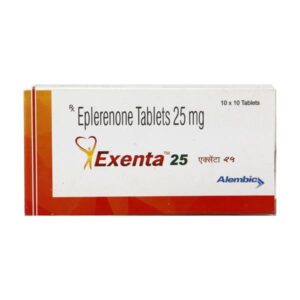EPLERNONE + TORSEMIDE
Eplernone: Eplernone, also known by its brand name Inspra, is a prescription medication that falls under the class of drugs known as selective aldosterone receptor antagonists. It is primarily used in the management of high blood pressure and heart failure.
Eplernone works by blocking the action of aldosterone, a hormone that promotes sodium and water retention in the body. By inhibiting aldosterone receptors, eplernone helps to reduce the amount of sodium and water in the body, thereby lowering blood pressure and reducing fluid accumulation in heart failure patients.
The recommended dose of eplernone for hypertension is typically 25 mg once daily, although this can be adjusted based on individual needs. For heart failure patients, the starting dose is usually 25 mg once daily, which may be increased to 50 mg once daily after 4 weeks if tolerated.
As with any medication, eplernone can cause certain side effects. Some common side effects include dizziness, headache, fatigue, flu-like symptoms, and increased levels of potassium in the blood (hyperkalemia). It may also cause digestive issues such as diarrhea and nausea.
While most people can tolerate eplernone without significant side effects, it is important to monitor potassium levels regularly, especially in patients with kidney problems or those taking other medications that can increase potassium levels.
It is crucial to consult with a healthcare professional for a proper evaluation of individual health and to determine the appropriate usage of eplernone.
Torsemide: Torsemide is a medication that belongs to a class of drugs known as loop diuretics. It is primarily used to treat fluid retention (edema) and high blood pressure (hypertension).
The mechanism of action of Torsemide involves blocking the reabsorption of sodium and chloride ions in the kidneys. By inhibiting the Na-K-Cl co-transporter in the loop of Henle, it enhances the excretion of water, sodium, chloride, and other electrolytes through increased urine production. This diuretic effect helps to reduce excess fluid in the body, leading to decreased swelling and lower blood pressure.
The dosage of Torsemide can vary depending on the condition being treated. For edema, the recommended starting dose is usually 20-40 mg per day, which may be increased if necessary. For hypertension, the starting dose is typically lower, around 5 mg per day, and can be gradually increased to achieve the desired blood pressure control.
Like any medication, Torsemide can have side effects. Common side effects may include dizziness, headache, increased urination, muscle cramps, nausea, and electrolyte imbalances (such as low levels of potassium or magnesium). It may also cause low blood pressure, especially when standing up suddenly, leading to lightheadedness or fainting. In some cases, allergic reactions can occur, characterized by skin rash, itching, swelling, or difficulty breathing.
It’s essential to follow the prescribed dose and regularly monitor electrolyte levels if using Torsemide. It should not be used if there is a known allergy to sulfa drugs, have severe liver or kidney disease, or if pregnant or breastfeeding. It’s important to consult with a healthcare professional for personalized advice and guidance on the use of Torsemide.


